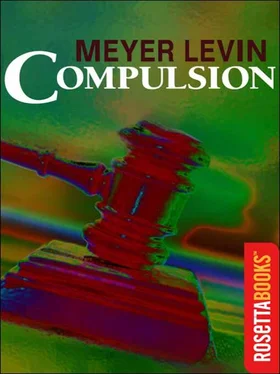How is Judd’s sleep? Dr. Allwin asks him. Does he fall asleep easily, or does he have some favourite fantasies, perhaps, before going to sleep? Judd becomes interested – this is a whole world of inquiry that he would not have thought of – and he talks quite freely, objectively. Yes, almost as far back as he can remember – “I used to make up these stories, before falling asleep. I was a king, sometimes, or else a slave-”
“Which were you more often, the king or the slave?”
“As it went on, I was almost always the slave.”
“It went on for a long time? Till the present?”
“Well, fairly recently.” Sometimes, he tells, it would last for an hour. He would lie on his stomach or on his side, usually hugging the pillow. After a while it would become very pleasant, with a pleasant warm bed odour, and he would imagine this was like the body odour of a naked slave who had been exerting himself, perhaps in battle, wielding a big sword and saving the life of the king. “Then the king would be grateful and offer to give the slave his liberty, but I would refuse, because I was devoted to the king.
“Another time I would be on a ship, and the vessel would be captured by pirates, and we would all be sold as slaves, and in the market place the Grand Vizier would notice me on the slave stand, and he would observe that I was more intelligent than all the rest, so he would buy me to become tutor for the young king, and then I would be branded.”
He breathes more deeply. “I would be branded on the inside calf of the right leg, a beautiful round mark of a crown-”
Another time he describes the king as his camp counsellor, when he was twelve. “His name was Chesty. He was about eighteen, and I admired him very much.
“Then I would picture myself as his slave. Sometimes it would be that the king got the slave as a stray baby found in the woods in a basket, or else the king was riding past the slave market and there was a boy of ten or twelve being sold, and the king took pity and bought him and took him for his personal slave. The king would have the boy slave come and sit with him, and he would pet him.”
“This was always your counsellor, Chesty?”
“After that summer it was other fellows, sometimes a teacher, and then a few years later we went up that summer to Artie’s in Charlevoix, and I began to idealize him, and from then on it was almost always Artie who was the king.”
“You idealized him?”
“I would see him as an athlete, a champion, even though I knew he is not a champion. And also. I would idealize him as a brilliant student, getting all A’s-”
“You knew his actual grades?”
“I knew Artie never got all A’s, but I told myself he could, if he wasn’t lazy. He has an almost perfect mind, and in other ways – sociability, and the ability to make people do what he wants – I would rate him very high. In fact, I once made a chart, and I rated everyone I knew, and Artie came out highest, ninety I think.”
“I see. You were aware, through all this, that you idealized Artie?”
Judd looks directly into his eyes. “It was blind hero worship. I almost completely identified myself with him. I would watch the food he ate, the drink going down his throat, and I would be envious.”
“And now?”
“Yes, even now. For a few days, I was angry with him. But now, when they take us through the corridors together sometimes, and to feel him near me, to brush against him, makes me feel I am alive.” He continues to look into Dr. Allwin’s eyes, not defiantly, not apologetically; Judd is entirely self-possessed, but there is between them, as a few days ago, a sense of shared pleasure in a task that is going well, even though its purpose remains obscure.
Another time, Judd recalls a reversed version of the fantasy, in which he was the king, and Artie was the slave. “We were on a sea voyage and we were shipwrecked, and came to an uncharted island. A piano was all we saved from the wreck, and I was the only one who knew how to play. There were natives on the island, and I was the only one who could speak their language.
“The natives of the island were divided into two groups, nobles and slaves. All of my companions were made slaves, but because of my ability to play the piano I was made a noble, for the natives knew nothing of music and were enchanted. Then, as a noble, I bought Artie to be my slave. He was very ill, and I nursed him back to health. Then when he was well, I gave him the choice of three alternatives:
“First, liberty. I would free him, and the brand mark on his right calf would be eliminated.”
“The slaves had been branded?”
“Yes. I would imagine this branding to be taking place, but it would not be on the island; it would be in the locker room of the Twain School, the locker room of the gym. Then we would be on the island and I would say, ‘If you choose liberty, you may go, but beware, because the first noble who sees you may capture you and make you his slave.’
“Secondly, he could remain my personal slave, in every sense of the word. Thirdly, I might sell him to some other noble. But if I did, he would receive bad treatment and would beg to come back to me. He would write me secret messages, using the pet secret word of the island. He would sign himself by that word.”
“And what was that?”
“Your kitty, or your pussy,” Judd says quietly.
I have tried to feel my way into the mind of Artie, but there are areas of impenetrable density that I suppose will for ever remain dark. It is curious that we all thought we knew Artie better than we knew Judd, since he was among us more, and perhaps that is why we puzzled less over him than over Judd. And another confusion resulted from our pairing them, from our feeling that they were in the crime to the same degree precisely, utterly commingled. This tendency to confuse them was to continue all the way through the trial, with lawyers and psychiatrists again and again naming the one when they meant the other. The record is filled with these snap-ups. “Steiner-” “You mean Straus?” “Yes, yes, I mean Straus-”
Thus they were a joint personality in our minds. Yet from their revelations to the psychiatrists, different patterns could be traced.
And despite the streaks of darkness in Artie’s revelations, a good deal can be made out of how these two distorted personalities conjoined. Artie was cunning and apt to withhold incidents in telling of his life. But when Dr. Allwin led him into his fantasy life, Artie, too, became easy and garrulous. Yes, he had indulged almost every night in picturizations, as he called them. There was something uncanny in the way they dovetailed with Judd’s.
Judd’s dominant fantasy rôle was that of a slave; Artie saw himself as a master. He was the chief of all criminals, commanding absolute obedience.
Even on the reverse side of their fantasies, there was an interlocking symmetry. Judd as a slave was, however, a superior being, a champion, a godlike, handsome person. Thus, while an inferior in the nominal side of his rôle he was superior on the active side. He lived in comfortable quarters, and he was the mentor of kings. Conversely, Artie was superior in the nominal side of his rôle he was a master mind, a chief, yet in carrying out his picturizations he saw himself as captured and jailed, chained and in rags. He derived greatest satisfaction from imagining himself incarcerated and whipped.
And in real life their fantasy relationships were carried out with beautiful inevitability. Both now related their strange compact, made after the frat-house robbery – the compact in which Artie was the master who must be implicitly obeyed; and yet, the other side of the agreement was the sexual act in which Artie had to submit and which was carried out in the spirit of a rape, a violence, almost a punishment – but, as in his fantasy, a punishment which he passively enjoyed.
Читать дальше












